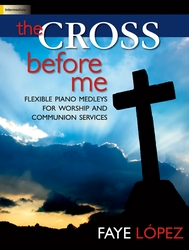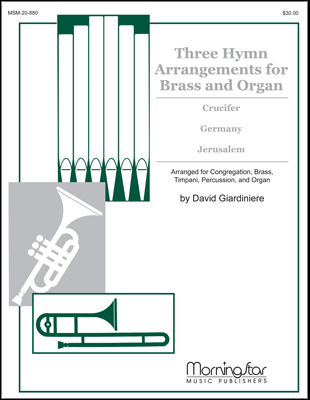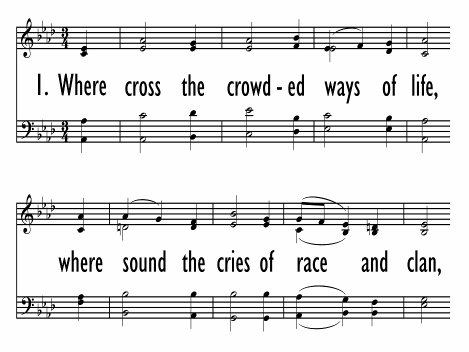Caleb T. Winchester, an editor of the 1905 Methodist Hymnal, challenged Frank M. North (b. Lower Manhattan, New York, 1850; d. Madison, NJ, 1935) to write a hymn text on city missions. North had intimate knowledge of urban life because of his work for the Methodist Church in New York City. Inspired by Jesus' words "Go to the street corners and invite to the banquet anyone you find" (Matt. 22:9), North wrote "Where Cross the Crowded Ways." After making various revisions and adding a title ("A Prayer for the Multitudes"), he published the text in The Christian City (June 1903), a missions journal he edited. The text was also published in the 1905 Methodist Hymnal and in many other twentieth-century hymnbooks. Modern hymnals have changed the original "thous" and "thees" to "yous."
One of the earliest and finest modern "city hymns," this text focuses on the ills of our great urban centers (and ignores their benefits) with the insight and compassion of a Christian worker in the city slums. North's descriptive phrases may have been startling at the turn of the century, but they are even more accurate descriptions of the massive cities in our world today. His prescription to follow in the footsteps of Christ and bring the gospel in word and deed is relevant as long as the Lord delays in bringing the New Jerusalem.
Primarily a churchman, North devoted himself to loyal service in the Methodist denomination and to various ecumenical ventures. He was educated at Wesleyan University, Middleton, Connecticut, and ordained in the Methodist Church in 1872. A minister in several churches in Florida, New York, and Connecticut, he also held administrative positions-secretary of the New York Church Extension and Missionary Society (1892-1912) and secretary of the Board of Foreign Missions of the Methodist Church (1912-1924). He was involved with the Federal Council of Churches of Christ in America (forerunner of the National Council of Churches) and was the council's president from 1916-1920. Editor of the periodical Christian City, North was active in many organizations that promoted and carried out Christian ministries in urban life. North contributed hymns to Sursum Corda (1898) and the Methodist Hymnal (1905) and was a charter member of the Hymn Society, which republished his eight hymns in a booklet in 1970.
Scripture References:
st. 1 = Matt. 9:36
st. 2 = Luke 19:41-42
st. 3 = Matt. 10:42, Mark 9:41
st. 5 = Rev. 21:2-4
Caleb T. Winchester, an editor of the 1905 Methodist Hymnal, challenged Frank M. North (b. Lower Manhattan, New York, 1850; d. Madison, NJ, 1935) to write a hymn text on city missions. North had intimate knowledge of urban life because of his work for the Methodist Church in New York City. Inspired by Jesus' words "Go to the street corners and invite to the banquet anyone you find" (Matt. 22:9), North wrote "Where Cross the Crowded Ways." After making various revisions and adding a title ("A Prayer for the Multitudes"), he published the text in The Christian City (June 1903), a missions journal he edited. The text was also published in the 1905 Methodist Hymnal and in many other twentieth-century hymnbooks. Modern hymnals have changed the original "thous" and "thees" to "yous."
One of the earliest and finest modern "city hymns," this text focuses on the ills of our great urban centers (and ignores their benefits) with the insight and compassion of a Christian worker in the city slums. North's descriptive phrases may have been startling at the turn of the century, but they are even more accurate descriptions of the massive cities in our world today. His prescription to follow in the footsteps of Christ and bring the gospel in word and deed is relevant as long as the Lord delays in bringing the New Jerusalem.
Primarily a churchman, North devoted himself to loyal service in the Methodist denomination and to various ecumenical ventures. He was educated at Wesleyan University, Middleton, Connecticut, and ordained in the Methodist Church in 1872. A minister in several churches in Florida, New York, and Connecticut, he also held administrative positions-secretary of the New York Church Extension and Missionary Society (1892-1912) and secretary of the Board of Foreign Missions of the Methodist Church (1912-1924). He was involved with the Federal Council of Churches of Christ in America (forerunner of the National Council of Churches) and was the council's president from 1916-1920. Editor of the periodical Christian City, North was active in many organizations that promoted and carried out Christian ministries in urban life. North contributed hymns to Sursum Corda (1898) and the Methodist Hymnal (1905) and was a charter member of the Hymn Society, which republished his eight hymns in a booklet in 1970.
Liturgical Use:
For urban ministries and other occasions that emphasize missions and diaconal work.
--Psalter Hymnal Handbook, 1987


 My Starred Hymns
My Starred Hymns






